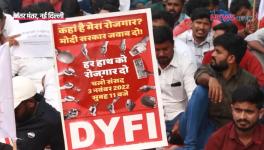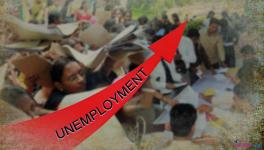50 days of Notebandi : Disastrous Impact of Modi’s Folly

Farmer distress due to demonetisation
Modi government’s historic blunder of banning notes on Nov.8 has destroyed the lives of crores of poor people in the country, causing irreversible damage that will cast a long shadow in the months to come. Typically, Modi and his sycophants have been going around claiming that this disastrous ‘plan’ will usher in achhe din for the country, ignoring the hardship and pain it has caused. Here is a brief look at some of the destructive results of Modi’s folly.
Jobs
Various economists have estimated that economic growth will dip by anything between 2 to 7 percent because of note ban. If the economy itself slows down, jobs are going to be lost. This is confirmed by evidence from all corners of the country. Various sectors like automobiles, construction and allied sectors, jewelry, textiles and real estate have reported temporary closures and retrenchments for formal/regular workers. Some reports have indicated that over 4 lakh jobs were lost in the first three weeks of note ban. In the textile sector, nearly 25% jobs were reportedly lost while over 60,000 workers became jobless in the leather sector and about 15-20% workers in the gems and jewelry sector lost their jobs. But the real axe has fallen on contract and casual workers in India’s informal sector that employs 94 percent of the workforce. Large scale stoppage of work was reported from agriculture, micro and small manufacturing, retail and wholesale trade, and various service sector units like shops, warehouses, etc. Informal sector job losses are such that when and how they will be recovered is uncertain. Large scale return migration of agricultural labour from states like Punjab has also taken place. Even MGNREGS jobs declined by 23 percent in the aftermath of notebandi. This was the most devastating blow to the poor given by Modi’s plan.
Wage Loss
Apart from those who lost their jobs, lakhs of agricultural labourers, casual labourers in rural and urban areas, and even formal sector workers lost wages for two to three weeks after the note ban. This was because the whole economy ground to a halt. In some parts of the country, like Jharkhand and Odisha’s tribal belt, daily wage fell to a mere Rs.50 per day. For these millions of daily earners, this was a huge damage and has pushed many into debt. Regular wage earners too had to spend days in queues trying to get out cash just to sustain themselves. Many had to barter away small items in exchange for other necessities while others were forced to accept payments in kind, often at much lower rates (like a kilo of rice for a day’s work).
Rabi crop
Another major economic loss at mass scale, especially in the Northern states, has been the delay in rabi sowing, especially of wheat. In the week ending 11 November, wheat sowing was down by 41 percent over the normal. After that it continued to be behind schedule and reached normal levels only by 16 December. It was only on 21 November, almost two weeks after the ban was announced that some concession was given for farmers to withdraw cash for completing the sowing process. Reports indicate that farmers somehow managed to get the sowing done after delaying as much as they could but they are now facing the problem of providing water, fertilisers, and other inputs. Many farmers have reported that new plants are not going to survive or may yield low grain output because of pinched input availability.
Farmers' prices
A direct result of the notes ban was that for several weeks afterwards, producers of fruits and vegetables were unable to transport their produce to bigger mandis because of lack of cash. This resulted in prices crashing in rural areas across the country, with some APMCs recording 70 percent drop in prices. In many areas farmers abandoned standing crops of tomatoes and other vegetables, or threw away harvested produce because they did not have the money to transport it. Small farmers have been especially hit because they did not have the kind of resources, credit-worthiness or connections to ride out the storm. Fruit farmers in the hilly states as also orange farmers in Vidarbha lost heavily because their precious crop was sold at throwaway prices.
Nutrition
According to various reports, govt. run nutrition programs in anganwadis and in schools have suffered because of the note ban. Anganwadis reported that over 16 lakh less children turned up to get supplementary nutrition across the country in November compared to October. This was because the anganwadi workers were struggling to arrange food for them with funds inaccessible in banks. Similarly about 5.8 lakh pregnant women and 4.7 lakh nursing mothers, both in dire need of nutrition, were unable to get the supplementary nutrition from anganwadis. Note that in India, over half of pregnant women are anemic and almost a third of infants/children are badly nourished. The sudden deprivation of nutrition would cause irreversible damage to them. Besides this, lack of cash has also destroyed family budgets and would have led to slashing of daily food consumption for at least a few weeks.
Other Suffering
Life was completely thrown out of gear with normal activities like schools, marriages, other family occasions, trips etc. getting postponed. Sickness and injury had to be neglected and treatment postponed, even child birth in remote areas was undertaken at home rather than the nearest govt. center because of lack of cash for transportation. In many cases when expenditures were unavoidable – as in a pre-fixed marriage or medical emergency – the family ran up a huge debt. Many families suffered losses because of having to exchange old notes for less than their value in emergencies. In many rural areas, commodities were selling at higher price if you had only old notes to give, effectively causing a loss to the owner of those notes. Those without bank accounts or who could not get easy access to their banks suffered the most.
Disclaimer: The views expressed here are the author's personal views, and do not necessarily represent the views of Newsclick.
Get the latest reports & analysis with people's perspective on Protests, movements & deep analytical videos, discussions of the current affairs in your Telegram app. Subscribe to NewsClick's Telegram channel & get Real-Time updates on stories, as they get published on our website.
























